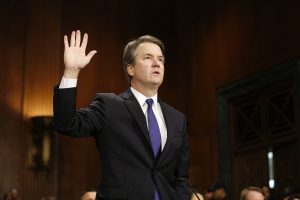


Today, the Senate Judiciary Committee is hearing allegations against Supreme Court nomineeJudge Brett Kavanaugh. This is likely to be the final stage in the process the will either approve or disapprove his appointment to the Court. Here is what you should know about the confirmation process.
What does Supreme Court confirmation entail?
According to the U.S. Constitution, federal judges—including Justices of the U.S. Supreme Court—are appointed by the president with the advice and consent of the U.S. Senate.
Although the process is not outlined in the Constitution, the determination of whether the judicial nominee is accepted by the Senate iscarried out by the Senate Judiciary Committee. mittee assumes the principal responsibility for investigating the background and qualifications of each Supreme Court nominee.
Since the late 1960s, the Judiciary Committee’s consideration of a Supreme Court nominee almost always has consisted of three distinct stages—(1) a pre-hearing investigative stage, followed by (2) public hearings, and concluding with (3) mittee decision on what mendation to make to the full Senate.
What happens during the a pre-hearing investigative stage?
During the pre-hearing investigative stage, the nominee responds to a detailed Judiciary Committeequestionnaire for the nominee. The FBI also investigates the nominee and provides mittee with confidential reports related to its investigation. During this time, the American Bar Association also evaluates the professional qualifications of the nominee, rating the nominee as “well qualified,” “qualified,” or “not qualified.” (Kavanaugh was rated “well qualified.”) Prior to mittee hearings, the nominee may also meet with any or all individual Senators. After the investigation, the Judiciary Committee holds its public hearings.
What happens during the public hearings?
Since 1955, Court nomineestestify in person before the Senate Judiciary Committee.
After opening remarks by the chair of the Judiciary Committee, other members follow with opening statements, and a panel of “presenters” introduces the nominee to mittee. The nominee is given the opportunity to make an opening statement and then begins taking questions.
Typically, the chair begins the questioning, followed by the ranking minority Member and then the rest of mittee in descending order of seniority, alternating between majority and minority members, with a uniform time limit for each Senator during each round. When the first round of questioning has pleted, mittee begins a second round, which may be followed by more rounds, at the discretion of mittee chair
What types of questions can be asked during the hearing?
The Senate can generally ask whatever they want, though thequestions are usually aboutthe nominee’s background and qualifications, judicial philosophy, past decisions as a judge, or views on current controversies.
A nominee can’t pelled to answer, and many refuse ment on issues that e up during their tenure on the Court.
How long does the hearing last?
For the most recent Supreme Court nominees, the hearings have lasted for four or five days. The longest hearing in the past 50 years was the failed nomination of Judge Robert Bork, which lasted 11 days.
What happens after the hearing?
After hearing the testimony of the nominee, the Judiciary Committee meets in open session to determine what mendation to report to the full Senate. mittee may (1) report the nomination favorably, (2) report it negatively, or (3) make no mendation at all on the nomination. A report with a negative mendation or no mendation permits a nomination to go forward, while alerting the Senate that a substantial number mittee members have reservations about the nomination.
The full Senate then votes on whether to accept or reject the nominee. Ifthe nominee is rejected, the President selects a new nominee and the process begins anew.









